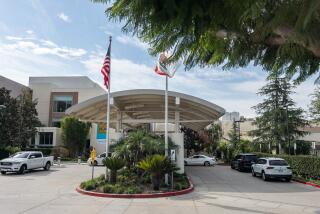6th Hospital Joins Drive in Urging Tests for AIDS
- Share via
SAN FRANCISCO — Marin General Hospital has joined five other Northern California hospitals in urging recipients of blood transfusions between 1977 and 1985 to consider having themselves tested for infection by the AIDS virus.
The announcement was the latest development in a growing debate over whether hospitals or doctors should be responsible for notifying transfusion recipients who may have been exposed to possibly contaminated blood.
Previously, three Kaiser Permanente hospitals in San Francisco, San Rafael and Vallejo and the UC Medical Center, San Francisco, had announced plans to mail letters to about 50,000 patients who received blood transfusions between 1977 and March, 1985.
In addition, the Shriners Hospital for Crippled Children in San Francisco in August also had mailed advisory letters to the parents of 233 children who had received transfusions during the 1977 to 1985 period, a hospital spokesman said Thursday.
All six hospitals involved had received blood products during that eight-year period from the Irwin Memorial Blood Bank, this area’s largest.
In Southern California, meanwhile, a Red Cross official said Thursday that her organization was not aware of any hospitals in the area that are planning to send similar letters to transfusion recipients.
Marin General spokeswoman Nancy Nickel said that the hospital, in Greenbrae, had not yet determined the precise number of patients who received blood during the crucial period, which was before a blood test became available to screen for blood contaminated with the AIDS virus.
“We are going to be tracing all those patients; 1977 is quite a ways back,” Nickel said.
Identification Period
She said the hospital expects within two months to identify all those who had transfusions and to send them letters urging that they consult their doctors about whether to check themselves for the infection.
The hospital’s move came amid growing pressure on Bay Area hospitals to establish policies on how--or whether--to notify blood transfusion recipients.
Officials at UC San Francisco Medical Center began discussing what to tell transfusion recipients after the federal Centers for Disease Control published a set of recommendations last March. The CDC report advised physicians to “consider offering” antibody tests for the acquired immune deficiency syndrome to “some” patients who received blood in the years before 1985.
The medical center’s officials decided to go beyond the centers’ recommendations, mailing letters to about 17,000 patients who received blood between 1977 and 1985.
Kaiser followed UC San Francisco’s lead after receiving a mid-August letter from the Irwin Memorial Blood Bank saying that as many as one out of every 100 blood transfusions may have contained the AIDS virus during the years from 1981 to 1983.
Supplies 42 Hospitals
Irwin is the main blood supplier for 42 hospitals in the Northern California counties of San Francisco, Napa, Solano, Marin, Shasta, Trinity, Modoc and Siskiyou. Hospitals in the Bay Area counties of Alameda, Contra Costa, Santa Clara and San Mateo receive their blood from other sources that are believed to have had much lower rates of AIDS virus contamination from 1977 to 1985.
Some Bay Area hospitals have chosen not to mail out advisory letters to blood recipients.
Dr. Thomas Jackson, director of transfusion service at Children’s Hospital in San Francisco, said his facility makes the AIDS antibody tests available without charge to any hospital patient whose physician requests it, but that the issue is left up to individual doctors and patients.
Deciding who is responsible for advising transfusion patients can be difficult, said Bruce Hasenkamp, vice president of the Hospital Council of Northern California. The issue raises questions of “what a hospital does and what a doctor does and what the balance between the two is,’ he said.
Kaiser spokesman Daniel Danzig said it is easier for an integrated health plan such as Kaiser to provide patients with “information and consistency.”
Calls From Patients
Meanwhile, the Kaiser Permanente Hospital in San Francisco this week has received about 400 telephone calls from people in response to its patient alert. “It has been busy, but it has not been overwhelming,” he said. Kaiser plans to do the mass mailing around the end of the year.
Officials at San Francisco General Hospital, where 20,000 blood transfusions were performed between 1977 and 1985, said they are considering a variety of options for notifying transfusion recipients, but that they probably will not mail advisory letters, Executive Director Phillip Sowa said. “Our population is a transient population,” he said, adding that an effort to notify recipients in 1983 had a very low success rate.
More to Read
Sign up for Essential California
The most important California stories and recommendations in your inbox every morning.
You may occasionally receive promotional content from the Los Angeles Times.













